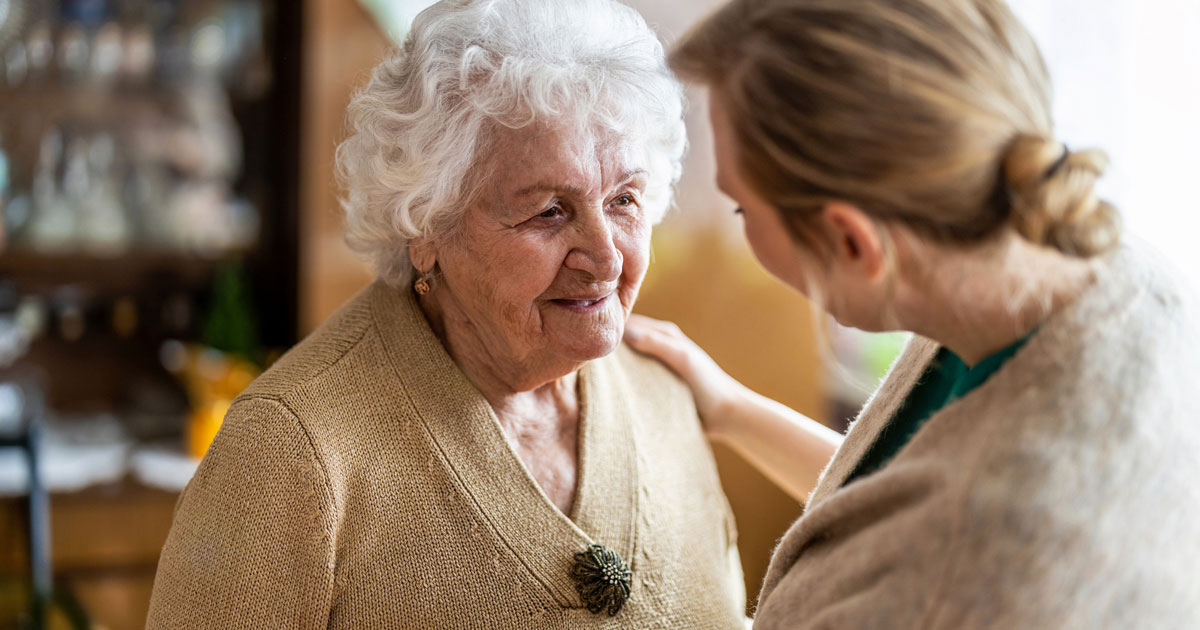
Communication is important for human connection. It allows us to express who we are, what we want, and relate to one another.
The symptoms of Alzheimer’s disease and other forms of dementia directly affect communication. Dementia is a progressive illness. Over time, people living with Alzheimer’s or dementia may struggle to remember basic facts like names, dates, and places.
This means that misunderstandings between people with dementia and those without dementia are common. This can lead to confusion and frustration, and lead both parties to feel overwhelmed. This is especially true when the relationship is between family members or friends who have communicated with ease in the past.
That said, communicating with dementia patients is possible, albeit via a slightly different approach than that to which most are accustomed. With the right combination of good listening skills, refined verbal communication, and close attention to nonverbal communication strategies, it is possible to improve communication.
Impacts of Dementia on Communication
Dementia influences how people express themselves and how they are able to understand others. It is important to note that these changes vary from person to person, and change as dementia progresses over time. For some people, their ability to communicate may even change on a day-to-day basis. The following are common changes:
- Difficulty finding the right word
- Substituting words for one another
- Describing an object rather than naming it
- Difficulty organizing words into logical sentences
- Repeating words or stories
- Mixing unrelated ideas
- Speaking less often
- Cursing or other offensive language
- Reverting to the first language that was learned
These changes make for a different type of communication. With the right adjustments and dementia communication techniques, though, communication can remain strong. The better you understand dementia, the better you can adjust to improve conversation.
Listening Skills
The first aspect of communicating with people with dementia is paying close attention to listening skills. Many of the ways that people listen in their daily lives, such as listening while multitasking, interrupting, and conversing quickly, may no longer work. The following adjustments will make for a stronger listener with people living with dementia.
Do Not Interrupt
People with dementia may take longer to respond. It is best not to interrupt their talking unless asked for help. Even if you think you know what they are going to say, it is best to give them a chance to say it for themselves.
Listen to Interpret
Many of the changes people with dementia demonstrate — describing an object, reverting to their first language, etc. — mean they may not state things as directly as others. Use the context and any other clues to try and guess what they are saying.
Make It Clear You Are Listening
It is important that the person with dementia can see you are listening with your full attention. There are numerous ways to demonstrate an attentive ear.
One way is to maintain eye contact. This demonstrates that you care what is being said, and that you are not engaged with another task at the same time.
Another way is to invite them into the conversation. Especially in contexts with more than two conversants, it can be harder for people with dementia to enter the conversation. Giving a direct indication to speak can encourage the person living with dementia that others are listening.
Allow Them to Speak for Themselves About Health
When it comes to issues of health and welfare, it is important to let people with dementia speak for themselves. The changes in their ability to communicate does not interfere with their understanding of their own health and wellness.
Repeat Back What You Heard
The best way to make sure that you have understood someone correctly is to repeat back what you heard. This ensures that nothing is lost in translation.
Related: Understanding Dementia Behaviors
Speaking Skills
Listening is important, but it is only half of the task at hand to communicate verbally. When communicating with people with dementia, it is also important to speak in ways that are comprehensible. The following tips can help improve how much of your speech is understood.
Offer Choices
Offer several possible options when people have choices to make. This is especially useful when you anticipate the person might resist doing something. For example, instead of telling someone to take a shower, ask if they would prefer to take their shower before or after eating dinner.
Give Respect
Because people with dementia may speak less, it can be easy to act like they are not present. Make sure to avoid speaking as if they are not in the room when they are present. Furthermore, avoid any talk that is diminutive or might be perceived as “baby talk.”
Finally, try not to correct mistakes and avoid arguing. Focus on giving encouragement rather than getting in disputes.
Reframe Questions
If someone struggles to answer a question, try to rephrase that question. In general, it is best to keep sentences short and framed in ways that yield simple answers. Sometimes someone might struggle to answer a question in one way, but be able to answer a comparable question with different phrasing.
Keep Tone Positive
Pay attention to the tone of voice you are using. Whenever possible, keep your voice friendly and positive. It is normal to experience emotions such as frustration and impatience. In these moments, it is okay to step outside and regain your composure.
Also see Social Interaction for People with Dementia.

Additional Communication Strategies
Speaking and listening are important to any communication, but they are not everything. Nonverbal cues, such as gestures and facial expressions, are important to good communication as well. Take note of the following tips that can help you stay in touch with nonverbal communication.
Physical Proximity
It is best to talk at the same level. If the person with dementia is sitting, get a chair or take a knee so that you are not speaking down at them.
Sometimes, it is best to step back and give space so as to not be intimidating; however, other times, a degree of physical contact can go a long way toward both parties feeling connected. This could be holding hands or patting their arm to indicate that you heard. If you are unsure, you can look at their body language or ask them directly to determine what would make them comfortable.
Visual Cues
Words are only one tool at your disposal. Oftentimes, demonstrating a task can help yield better understanding and encourage participation. For example, when suggesting to wash their hands, mimic washing soap on your hands.
Stay Patient and Calm
Keep in touch with your body to remain patient and calm. Watch for signs of stress or anxiety (leg tapping, quick speech, muscle tension). If you notice that you are not calm, they might also pick up on that tension.
Avoid Distractions
Keep an eye on possible distractions that could make it harder to hear. Avoid background noise that makes it difficult to hear. Furthermore, visual stimuli, like televisions, can make it harder to focus by distracting the person’s attention away from the conversation.
Additional Reading:
Conclusion
Alzheimer’s and other dementias impact a person’s ability to communicate. These changes can be hard to manage, especially for those who are unfamiliar with the disease.
Over time, dementia changes and so does the best communication style. Deep understanding and a variety of approaches will help develop good listening skills, clear speaking, and other nonverbal cues to help both you and the person with dementia better understand one another.
Located in Idaho? Learn more about our dementia care services.
